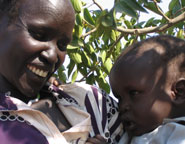
|

|

|
Sudan is marked by immense cultural, religious and geographic diversity.Over 400 ethnic groups have their own language which they use along side a trade language such as Arabic. Khartoum, the largest city in the country, has a population of about six million. Sudan's current total population is around 35 million people. The official language of the north is Arabic and in the South, English. More than half of the population is Muslim. One-third, mainly in the South, are Christian. In addition, many ethnic groups practice traditional African religions. In this context, the social attitudes towards women differ greatly depending on these regional and cultural contexts. For example, women in the North are bound by Islamic law which restricts their movements and has created a society segregated along gender lines; on the other hand, southern Sudanese women have more access to mobility and active participation in their communities, but are still limited in many ways. In all of Sudan, however, women are generally considered subordinate to men and are expected to take care of an immediate and extended family. Traditionally, women have been isolated from men in Sudanese culture. They did not have access to schools and norms made it difficult for them to talk freely to men or in the public. Polygamy is commonplace. In Sudan, the manual work that is generally disliked by men and which takes place in the home has been relegated to the women.
|

